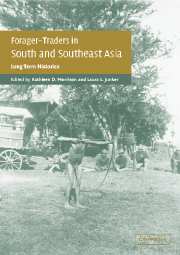1 - Historicizing adaptation, adapting to history: forager-traders in South and Southeast Asia
Published online by Cambridge University Press: 22 September 2009
Summary
In South and Southeast Asia today, as in many other parts of the world, there exist people who subsist, in part, by the gathering of wild plants and the hunting of wild animals. Many of these people are also engaged in larger-scale national and international political, social, and economic relationships. They may speak the same languages as others who plant, trade, herd, and rule; they may trade with them, marry them, work with and for them. Archaeological, historical, and biological data lead us to believe that this is not a new situation but instead one of long duration, perhaps nearly as long as the Holocene itself. In this volume we consider the long-term histories of some of these people who gather and hunt and their relationships to agriculturalists and states, in the process grappling with issues of the complex nature of these interactions. In moving beyond polemics to consider the substantive cultural and biological histories of South and Southeast Asian forager-traders, we aim both to focus on the historical specificity of our cases and to forge broader comparisons within and across regions. While close reading of individual cases reminds us to resist the urge to reify such fluid and often partial categories as “farmer,” “forager,” and even specific ethnic/cultural labels, the exercise of comparison reminds us that such categories can have an analytical utility, and that the similarities and differences between the complex histories of interaction in these two regions may help us to forge better understandings of the cultural, biological, and historical processes that shaped them.
- Type
- Chapter
- Information
- Forager-Traders in South and Southeast AsiaLong-Term Histories, pp. 1 - 18Publisher: Cambridge University PressPrint publication year: 2002
- 4
- Cited by

